-
 Bitcoin
Bitcoin $106,782.3966
-0.72% -
 Ethereum
Ethereum $2,406.7764
-1.16% -
 Tether USDt
Tether USDt $1.0005
0.02% -
 XRP
XRP $2.0918
-1.53% -
 BNB
BNB $644.5785
-0.17% -
 Solana
Solana $141.0925
-0.69% -
 USDC
USDC $1.0000
0.02% -
 TRON
TRON $0.2721
0.18% -
 Dogecoin
Dogecoin $0.1585
-1.26% -
 Cardano
Cardano $0.5497
-1.14% -
 Hyperliquid
Hyperliquid $35.8493
-1.58% -
 Bitcoin Cash
Bitcoin Cash $502.3089
2.20% -
 Sui
Sui $2.7092
3.87% -
 Chainlink
Chainlink $12.8551
-1.85% -
 UNUS SED LEO
UNUS SED LEO $9.0548
0.53% -
 Stellar
Stellar $0.2344
-0.85% -
 Avalanche
Avalanche $17.2676
-0.23% -
 Toncoin
Toncoin $2.8282
0.56% -
 Shiba Inu
Shiba Inu $0.0...01113
-1.14% -
 Litecoin
Litecoin $83.9593
-0.93% -
 Hedera
Hedera $0.1447
0.82% -
 Monero
Monero $306.9022
-2.07% -
 Bitget Token
Bitget Token $4.6358
3.42% -
 Dai
Dai $0.9999
0.01% -
 Ethena USDe
Ethena USDe $1.0001
0.02% -
 Polkadot
Polkadot $3.3211
0.06% -
 Uniswap
Uniswap $6.8775
0.75% -
 Pi
Pi $0.5664
-0.27% -
 Aave
Aave $256.0055
1.28% -
 Pepe
Pepe $0.0...09013
-3.24%
Can ADA wallet address be stolen? Summary of security protection measures
An ADA wallet address itself cannot be stolen, but private keys can be compromised through phishing, malware, or social engineering, leading to fund theft.
May 13, 2025 at 01:07 pm
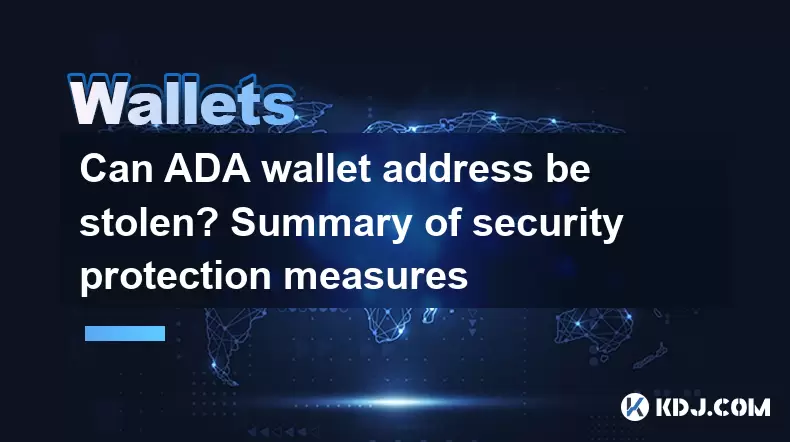
Introduction to ADA Wallet Address Security
When it comes to cryptocurrencies like Cardano (ADA), the security of your wallet address is paramount. Theft of an ADA wallet address is a concern for many users, as it could potentially lead to the loss of funds. In this article, we will delve into whether an ADA wallet address can be stolen and provide a comprehensive summary of security protection measures that users can implement to safeguard their assets.
Understanding ADA Wallet Addresses
An ADA wallet address is a unique string of characters that serves as a destination for sending and receiving Cardano cryptocurrency. It is crucial to understand that an ADA wallet address itself cannot be stolen in the sense that someone cannot take it away from you. However, what can be stolen are the private keys associated with that address, which grant access to the funds stored in the wallet.
How Private Keys Can Be Compromised
The theft of an ADA wallet address typically involves the compromise of the private keys. Private keys are the critical piece of information that allows users to sign transactions and control the funds in their wallet. If a malicious actor gains access to these keys, they can transfer the funds to another wallet, effectively stealing them. Common methods of private key theft include phishing attacks, malware infections, and social engineering.
Phishing Attacks and ADA Wallet Security
Phishing attacks are one of the most common ways that attackers attempt to steal ADA wallet addresses and their associated private keys. In a phishing attack, a user is tricked into providing sensitive information through a fraudulent website or email. To protect against phishing, users should always verify the authenticity of websites and emails before entering any wallet information. Using hardware wallets can also add an extra layer of security, as they store private keys offline, making them less susceptible to online phishing attempts.
Malware and Protecting Your ADA Wallet
Malware is another significant threat to ADA wallet security. Malicious software can be installed on a user's device without their knowledge, potentially capturing private keys and other sensitive information. To mitigate this risk, users should ensure their devices are protected with up-to-date antivirus software. Additionally, using a dedicated device for cryptocurrency transactions can help isolate potential threats from other activities on a user's primary computer or phone.
Social Engineering and ADA Wallet Safety
Social engineering attacks involve manipulating individuals into divulging confidential information. Attackers might pose as customer support representatives or other trusted entities to trick users into revealing their private keys. To combat social engineering, users should be wary of unsolicited communications and never share their private keys with anyone. Educating oneself on common social engineering tactics can also help in recognizing and avoiding these threats.
Best Practices for ADA Wallet Security
To maintain the security of your ADA wallet address and its associated private keys, there are several best practices that users should follow:
- Use Hardware Wallets: Hardware wallets store private keys offline, reducing the risk of online theft. Popular hardware wallets for ADA include Ledger and Trezor.
- Enable Two-Factor Authentication (2FA): 2FA adds an additional layer of security by requiring a second form of verification before accessing your wallet.
- Regularly Update Software: Keep your wallet software and any associated applications up to date to protect against known vulnerabilities.
- Backup Your Wallet: Regularly back up your wallet to a secure location, such as an encrypted external drive or a safe deposit box, to prevent loss of funds in case of device failure.
- Use Strong Passwords: Employ strong, unique passwords for your wallet and any associated accounts to prevent unauthorized access.
Implementing Security Measures Step-by-Step
Here is a detailed guide on how to implement some of the security measures mentioned above:
Setting Up a Hardware Wallet for ADA:
- Purchase a reputable hardware wallet that supports ADA, such as a Ledger or Trezor.
- Follow the manufacturer's instructions to set up the device, which usually involves initializing it and setting a PIN.
- Download the appropriate software for your hardware wallet from the official website.
- Connect the hardware wallet to your computer and follow the on-screen instructions to set up your ADA wallet.
- Transfer your ADA to the new address generated by your hardware wallet.
Enabling Two-Factor Authentication (2FA) on Your ADA Wallet:
- Open your ADA wallet software or app.
- Navigate to the security settings or account settings section.
- Look for an option to enable 2FA and select it.
- Follow the prompts to set up 2FA, which typically involves scanning a QR code with an authenticator app on your mobile device.
- Enter the code generated by the authenticator app to complete the setup process.
Backing Up Your ADA Wallet:
- Open your ADA wallet software or app.
- Navigate to the backup or export section.
- Follow the prompts to create a backup, which may involve generating a recovery phrase or exporting a wallet file.
- Store the backup in a secure location, such as an encrypted external drive or a safe deposit box.
Frequently Asked Questions
Q: Can someone steal my ADA wallet address if they know it?
A: No, knowing your ADA wallet address alone does not allow someone to steal your funds. They would need access to your private keys to do so.
Q: Is it safe to share my ADA wallet address publicly?
A: Yes, it is generally safe to share your ADA wallet address publicly, as it is designed to be shared for receiving funds. However, always be cautious of where and how you share it to avoid potential scams.
Q: What should I do if I suspect my ADA wallet has been compromised?
A: If you suspect your ADA wallet has been compromised, immediately move your funds to a new, secure wallet. Change any passwords associated with your wallet and consider using a hardware wallet for added security.
Q: How often should I back up my ADA wallet?
A: It is recommended to back up your ADA wallet every time you make significant changes, such as adding new funds or generating new addresses. Regular backups ensure you can recover your funds in case of device failure or loss.
Disclaimer:info@kdj.com
The information provided is not trading advice. kdj.com does not assume any responsibility for any investments made based on the information provided in this article. Cryptocurrencies are highly volatile and it is highly recommended that you invest with caution after thorough research!
If you believe that the content used on this website infringes your copyright, please contact us immediately (info@kdj.com) and we will delete it promptly.
- Smart Investors Navigate the AI Token Frenzy: Bitcoin Switch and Beyond
- 2025-06-28 12:30:12
- Crypto in 2025: How Web3 AI is Poised to Dominate
- 2025-06-28 12:30:12
- Solana's Support Level Holds as MACD Crossover Hints at Potential Bullish Reversal
- 2025-06-28 12:50:12
- Cathie Wood's Ark Invest: Navigating Coinbase (COIN) and SoFi (SOFI) in a Shifting Market
- 2025-06-28 12:53:43
- Crypto 2025: Spotting the Top Coins with Real Utility
- 2025-06-28 12:42:12
- Pepe Price's Wild Ride: Cryptocurrency Milestone or Just Another Meme?
- 2025-06-28 12:42:13
Related knowledge

How to stake cryptocurrencies on Coinbase? Benefits and risks
Jun 27,2025 at 06:36pm
Understanding Cryptocurrency Staking on CoinbaseStaking cryptocurrencies involves locking up digital assets to support the operations of a blockchain network, typically in return for rewards. Coinbase, one of the most popular cryptocurrency exchanges globally, offers staking services for several proof-of-stake (PoS) coins. Users can stake their holdings...
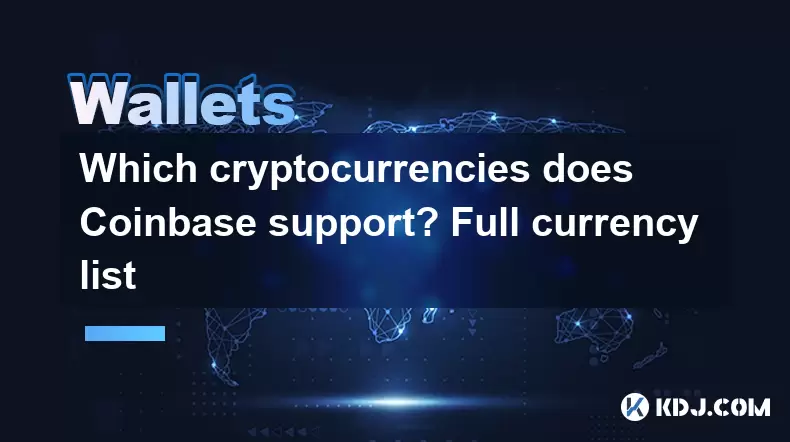
Which cryptocurrencies does Coinbase support? Full currency list
Jun 28,2025 at 08:36am
Overview of Cryptocurrencies Supported by CoinbaseCoinbase is one of the most popular and trusted cryptocurrency exchanges globally. It provides users with a platform to buy, sell, trade, and store various digital assets. As of the latest updates, Coinbase supports over 200 cryptocurrencies, including major ones like Bitcoin (BTC), Ethereum (ETH), and L...
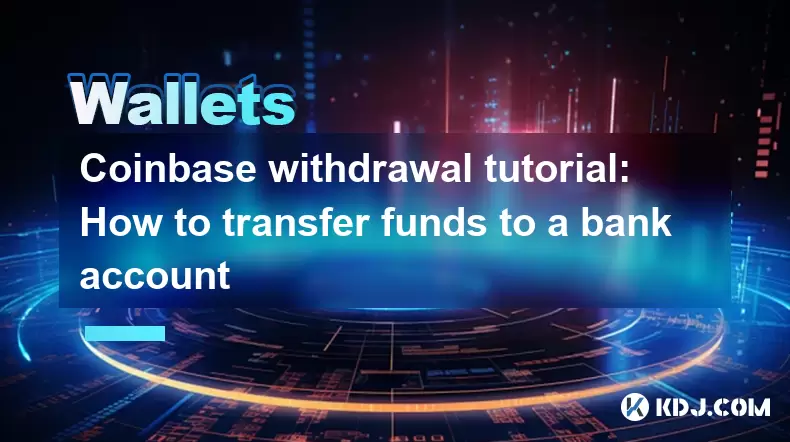
Coinbase withdrawal tutorial: How to transfer funds to a bank account
Jun 28,2025 at 02:35am
Understanding Coinbase WithdrawalsCoinbase is one of the most widely used cryptocurrency platforms, allowing users to buy, sell, and store digital assets. Once you've successfully traded or held your crypto on Coinbase, the next logical step may be to withdraw funds to a bank account. This process involves converting your cryptocurrency into fiat curren...
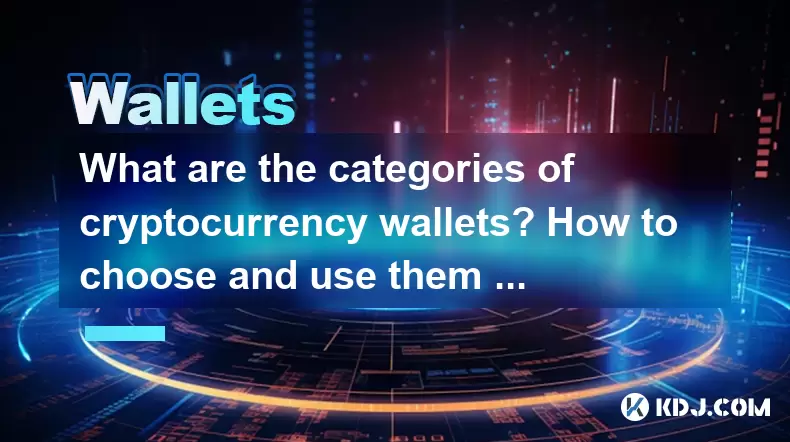
What are the categories of cryptocurrency wallets? How to choose and use them safely?
Jun 21,2025 at 10:42pm
Understanding Cryptocurrency WalletsCryptocurrency wallets are essential tools for anyone involved in the digital asset ecosystem. They allow users to store, send, and receive cryptocurrencies securely. Unlike traditional wallets that hold physical money, crypto wallets manage cryptographic keys—private and public—which interact with blockchain networks...
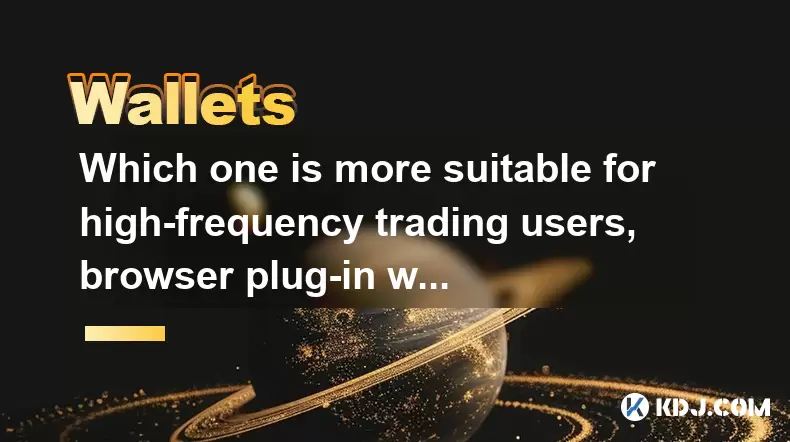
Which one is more suitable for high-frequency trading users, browser plug-in wallets or independent application wallets?
Jun 23,2025 at 08:22am
Understanding the Role of Wallets in High-Frequency TradingFor high-frequency trading (HFT) users in the cryptocurrency market, wallet selection is critical due to the need for speed, security, and seamless integration with trading platforms. HFT involves executing a large number of trades within seconds or even milliseconds, which demands a wallet that...

What are the differences between the operating mechanisms of on-chain wallets and off-chain wallets? Is there a big difference in transaction fees?
Jun 25,2025 at 08:49am
Understanding On-Chain WalletsOn-chain wallets are digital wallets that directly interact with the blockchain network. These wallets store users' private keys, which are essential for signing and authorizing transactions on the blockchain. When using an on-chain wallet, every transaction must be recorded and verified by the decentralized nodes in the ne...

How to stake cryptocurrencies on Coinbase? Benefits and risks
Jun 27,2025 at 06:36pm
Understanding Cryptocurrency Staking on CoinbaseStaking cryptocurrencies involves locking up digital assets to support the operations of a blockchain network, typically in return for rewards. Coinbase, one of the most popular cryptocurrency exchanges globally, offers staking services for several proof-of-stake (PoS) coins. Users can stake their holdings...

Which cryptocurrencies does Coinbase support? Full currency list
Jun 28,2025 at 08:36am
Overview of Cryptocurrencies Supported by CoinbaseCoinbase is one of the most popular and trusted cryptocurrency exchanges globally. It provides users with a platform to buy, sell, trade, and store various digital assets. As of the latest updates, Coinbase supports over 200 cryptocurrencies, including major ones like Bitcoin (BTC), Ethereum (ETH), and L...

Coinbase withdrawal tutorial: How to transfer funds to a bank account
Jun 28,2025 at 02:35am
Understanding Coinbase WithdrawalsCoinbase is one of the most widely used cryptocurrency platforms, allowing users to buy, sell, and store digital assets. Once you've successfully traded or held your crypto on Coinbase, the next logical step may be to withdraw funds to a bank account. This process involves converting your cryptocurrency into fiat curren...

What are the categories of cryptocurrency wallets? How to choose and use them safely?
Jun 21,2025 at 10:42pm
Understanding Cryptocurrency WalletsCryptocurrency wallets are essential tools for anyone involved in the digital asset ecosystem. They allow users to store, send, and receive cryptocurrencies securely. Unlike traditional wallets that hold physical money, crypto wallets manage cryptographic keys—private and public—which interact with blockchain networks...

Which one is more suitable for high-frequency trading users, browser plug-in wallets or independent application wallets?
Jun 23,2025 at 08:22am
Understanding the Role of Wallets in High-Frequency TradingFor high-frequency trading (HFT) users in the cryptocurrency market, wallet selection is critical due to the need for speed, security, and seamless integration with trading platforms. HFT involves executing a large number of trades within seconds or even milliseconds, which demands a wallet that...

What are the differences between the operating mechanisms of on-chain wallets and off-chain wallets? Is there a big difference in transaction fees?
Jun 25,2025 at 08:49am
Understanding On-Chain WalletsOn-chain wallets are digital wallets that directly interact with the blockchain network. These wallets store users' private keys, which are essential for signing and authorizing transactions on the blockchain. When using an on-chain wallet, every transaction must be recorded and verified by the decentralized nodes in the ne...
See all articles























































































